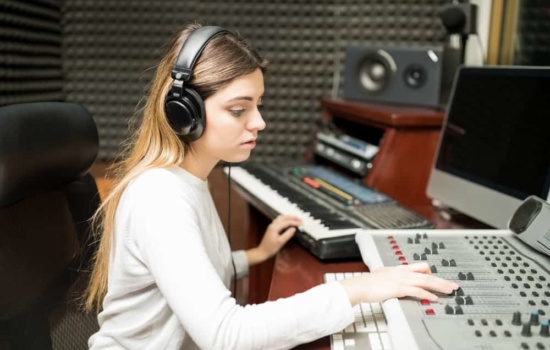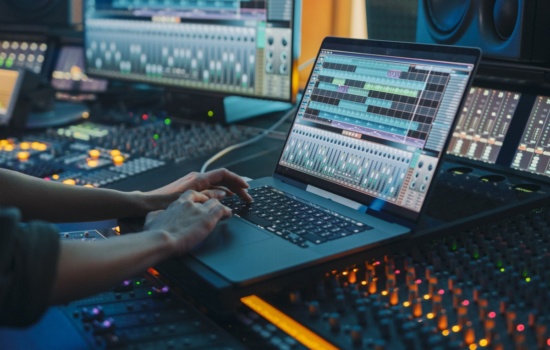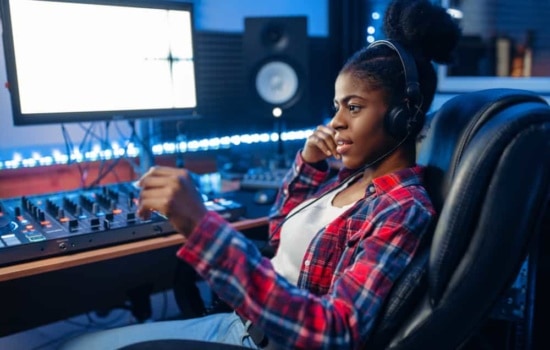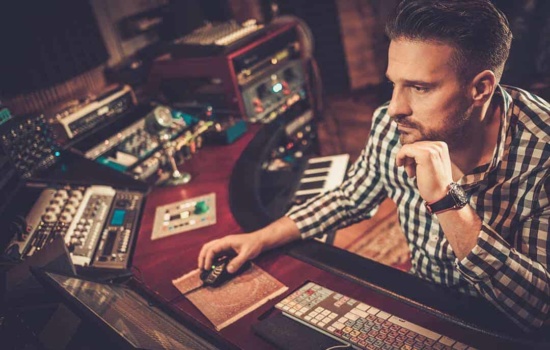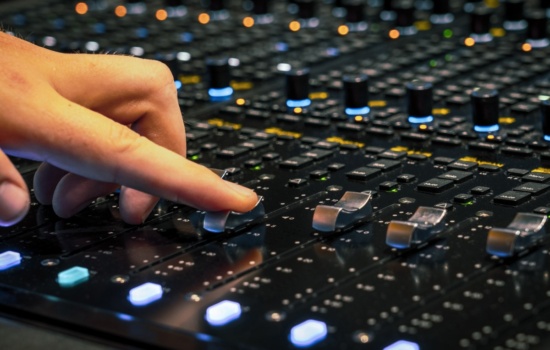Music Career Finder
Start Here:
Audio Engineer
Career Overview
An audio engineer records and edits music in collaboration with artists, music producers, labels, managers, and/or assistants, both in the studio and for live performances. This role can involve every part of the recording and editing process, from setting up the studio to mixing/mastering the final song for public release.
Alternate Titles
Recording Engineer, Mixing engineer, Mastering engineer, Sound Engineer
Avg. Salary
$74,100 per year ($35 per hour)1
Salary Range
$36,160 to $132,940+ per year1
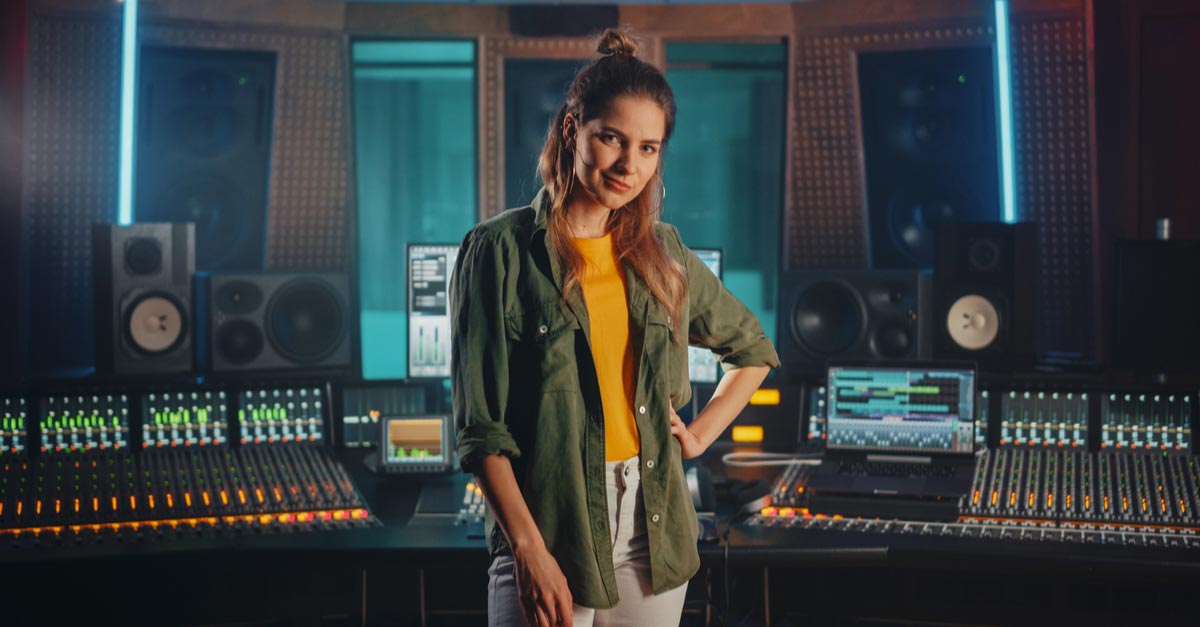
How To Become an Audio Engineer
- An audio engineer records and edits a song as well as maintains and sets up recording equipment
- Audio engineers typically work long days
- The best way to start a career as an audio engineer is to intern at a recording studio
- You can also start your career by recording, mixing, and mastering at home
- Audio engineers are paid hourly, per day, or per project
- The average income for an audio engineer is $35.62 per hour or $74,100 a year
- Career Description
- Salary
- Career Outlook
- Career Path
- Experience & Skills
- Education & Training
- Sources
- References
Career Description
An audio engineer helps record and edit a song to prepare it for public release.
They are the person that, traditionally, sits at the big soundboard in a recording studio. To record and edit a song, they often collaborate with the artist, the artist’s producer, the artist’s record label, and even the artist’s manager.
What Does an Audio Engineer Do?
Here are the main responsibilities of an audio engineer working in a recording studio:
- Ensure all equipment is working properly
- Setting up recording sessions
- Run all cables into the mixing console
- Choosing the right equipment for the instrument being recorded
- Positioning the microphones
- Managing the controls at the soundboard during recording
- Maintain and repair sound equipment
- Editing recordings using a digital audio workstation (DAW)
- Mixing and mastering the recorded track for distribution
Here are the main responsibilities of an audio engineer working in a live performance setting:
- Setting up the equipment (microphones, speakers, cables, etc.)
- Running sound check before the event/concert
- Repair sound equipment
- Editing and mixing the live audio from a soundboard in real-time so it sounds good to the audience
- Recording the live audio for playback or public distribution
A Day In the Life of an Audio Engineer
Julian Dreyer (The Avett Brothers, Steve Martin, Band of Horses) said the first part of an audio engineer’s day is to prepare for the recording session.
“Essentially, your job is to capture what’s going on by setting up microphones and plugging things in, and then to mix it all down to a stereo file that can be played on the radio,” he said.
And if you’re working in a professional recording studio, you can expect to work long days.
Grammy-nominated engineer Dana Nielsen (SZA, Rihanna, Adele, Bob Dylan) works with local recording studios to help bands and artists record their music.
In that setting, he said he sometimes will work 14- or 15-hour days, 6-7 days a week. And a project could go on for a few days to several months.
“It’s like being on red alert all day,” he said. “Listening for things, anticipating what the artist needs, what the producer needs…and there’s really no downtime, even to hop to the bathroom.”
However, he mainly works from his home studio mixing and mastering music for both indie and label artists.
In this setting, he’ll do a couple of hours on multiple projects each day, trying to get each of his clients some deliverables every day (ex. rough mix, updated mix, final mix/master, etc.).
Understanding Mixing and Mastering Music
We’re going to be talking about “mixing music” and “mastering music,” two skills an audio engineer needs to learn. So let’s define each in general terms.
Salary
According to the United States Bureau of Labor Statistics, the average hourly pay for an audio engineer is $35.62 and the average annual salary is $74,100.
However, when you’re just starting on your path as an audio engineer, you may not get paid much or anything at all. Many future audio engineers start as unpaid interns at a professional recording studio (also called a “runner” – someone who runs errands for the engineer in charge).
How Do Audio Engineers Make Money?
Here are the different ways you can earn money as an audio engineer:
- Freelance audio engineer: charge a day rate or hourly rate (Nielsen said you could charge $30-100 per hour starting out)
- Freelance mixing/mastering engineer and/or producer: charge a per-song rate
- Employee of a recording studio: earn an hourly rate (Dreyer said you could be working for as little as $10-12 per hour starting out)
As a freelancer, Nielsen said that “every deal can be wildly different,” but eventually, you’ll get enough experience that you’ll figure out what your rates should look like.
If you’re a beginner, he said you should track your hours so you can understand how long different tasks take, then adjust your rates for future projects based on how much you want to get paid per hour.
“There’s so many factors, and you kind of get what you can until you have enough of that experience and you’ve done enough of those different deals and you know what works for you…,” he said. “Then you can have these benchmarks of like, ‘Well this is my rate, and I will bend on that if I really like what you’re doing…’ Then you start to establish some minimums.”
It all depends on how much you want to make, how long it takes you to do the task at hand, and what fits within the typical budget of your target clients.
Hey, what do you think about trying our new Music Career HelperMusic Career Helper really quick? It’s totally free and could help get your career moving fast! Give it a try. It’s totally free and you have nothing to lose.
Career Outlook
In talking with audio engineers, we noticed a common theme: dedication.
If you want to succeed in this career, you need to be prepared to work long hours, commit to the craft of audio engineering, and learn the technical aspects necessary.
Because of the commitment required, Brian Scheuble (Ringo Starr, Fiona Apple, Nine Inch Nails) said you have to love it.
“…It’s a great career if you love music, like working in a creative atmosphere, and you enjoy collaborating with artists and musicians,” he said.
It’s more of a lifestyle than a career, according to Dreyer. You may practically live at the studio where you work.
“You’re going to have to go through several years of working really long hours for not much money,” he said. “So it’s one of those careers where you’ve really got to be into it, or you’re not going to make it to the point where you’re making a decent living at it, ever.”
According to Ariel Chobaz (Nicki Minaj, Drake, Rihanna), to make audio engineering your career, you should be working in audio in your free time just because you want to.
“It takes a lot of commitment and sacrifice in order to move ahead and become successful,” he said. “And people who aren’t truly passionate about it on a core level get weeded out quickly.”
Bobby Owsinski (Jimi Hendrix, The Ramones, The Who) said you need to be prepared to spend years building your career before you find even moderate success.
“There are lots of ups and downs, and it can take quite a while until you break out and are making a steady amount of money…” he said. “It’s a matter of if you’re willing to stick at it long enough—because it could take some time.”
Is there a high demand for audio engineers?
More and more people are recording music from home, learning how to mix, and using DAW plugins or AI to master their music. So as a budding audio engineer, you may wonder if this is even a good career to get into.
Nielsen said that it may be harder than it used to be to become an engineer, but there will always be people who are willing to pay to work with an expert.
“I think it definitely makes it harder to stand out as a freelance audio engineer because more and more people do have these skills,” he said. “But I think that there will always be a level of artist who doesn’t want to do that themselves, isn’t interested in doing that, and wants the best people possible handling all aspects of their journey.”
People who care about the quality of their music are more likely to work with someone who knows what they’re doing.
How Will Artificial Intelligence Affect Audio Engineers?
Artificial Intelligence music is on the rise, and it probably isn’t going to go away. You can give an AI website a prompt to write a pop song about your dog named Fluffy, and it will pump out a catchy song about your pet.
So the big question is: will AI hurt audio engineers?
Nielsen is very impressed by what AI can do in the music realm, calling it “sometimes scarily good,” but he’s not too worried (at least right now) about it having a negative effect on audio engineers.
“A lot of it I find very helpful for me in certain situations,” he said. “…And I have no doubt that that stuff will get better and better and [have] more and more options and that it’ll apply to mixing… I think that, at the moment, it seems like while those results are impressive and valid and cool and interesting, the ability to really fine-tune things…you’re limited.”
He hopes that people will still want the “tailor-made” process of working with a human engineer.
“…I hope, for my sake, [AI] will never offer the same level of customization and care…” he said. “That’s part of the joy of working with other people, collaborating with other people, getting what somebody brings.”
As AI becomes more advanced and can do more for musicians, people will probably start to crave the authenticity and rawness that only a human can offer. So as of today, knowing what we know now, audio engineering is a good career to get into, as long as you offer more customization and care than AI can.
Career Path
When embarking on a career as an audio engineer, there are generally two main paths you can take: the traditional studio route or the self-taught, independent approach.
Both paths have their own unique challenges and rewards, and the choice between them often depends on your personal circumstances, goals, and opportunities.
Path #1: Traditional Studio Route
In the traditional studio setting, the career path typically begins at the very bottom, often as a runner, “gofer,” or an unpaid intern.
This entry-level position involves basic tasks like fetching coffee and food, moving equipment, and generally assisting the head engineer however they need.
In this role, Owsinski said you’re basically an errand-runner and you may not even see the music being made.
“You’re a Runner or a Gofer, and if you’re lucky, you get to hang around the studio and see things,” he said.
However, if you do get to witness how the music is made (which many studios encourage of their junior staff), it can be an invaluable learning experience.
Usually, after two to three years, a runner may advance to the role of Assistant Engineer, where they begin to take on more technical responsibilities.
With persistence and skill, you may eventually be ready to handle your own sessions, said Owsinski.
“It doesn’t mean you’re going to be great at it, but you can do it,” he said.
The traditional path can be rewarding, particularly if you find yourself in the right place at the right time, working with artists who are also on the rise.
This can lead to rapid career advancement and opportunities to work on high-profile projects.
Path #2: Independent, Self-Taught
On the other hand, some aspiring audio engineers choose a more independent route, teaching themselves the craft through hands-on experience with their own projects and friends’ projects.
This path requires a high level of dedication and self-motivation because it often lacks the structured mentorship and immediate feedback you would get in a studio environment.
The learning curve can be steep, and it typically takes longer to reach a professional level of competence compared to the studio route.
However, the independent path allows for more creative freedom and the ability to develop a unique style or niche in the industry.
It’s also a viable option for those who may not have access to larger studios or who prefer to work on their own terms.
Both paths can lead to success in the audio engineering field, but they require different strategies and mindsets.
Owsinski said you need to be able to get along with others regardless of your path.
“Personality really matters because if you’re going to be locked in a room with somebody for a long period of time, you want to be able to get along with them,” he said.
Basically, it’s not just what you know or what you can do, it’s who you are as a person.
Experience & Skills
When starting out as an audio engineer, gaining experience is crucial, even if it means working without pay.
Regardless of your path, you need to record something to build your portfolio – even if it’s a personal project or a free gig for a local band.
The more you work on recording projects, the more experience you’ll gain, and the better your portfolio will become.
Networking and developing the right social skills are also essential to grow your career. Dreyer emphasizes the importance of social dynamics and being a good person to work with.
“Having the ability to be proficient at the technical part of your job, but also be skilled at quickly identifying and sussing out the social dynamic if you’re working with bands, which are like five-way marriages…” he said.
“The ultimate goal of an Audio Engineer is to be invisible, meaning that you are facilitating the process of recording music in a way that doesn’t get in the way of the artist’s ability to feel comfortable and creative.”
To succeed as an audio engineer, you’ll need to develop a broad range of skills, including:
- Technical proficiency with audio software and equipment
- Knowledge of sound and room acoustics
- Audio editing, mixing, and mastering
- Critical listening
- Collaboration and good communication
- Problem-solving and being able to fix equipment
- Adaptability and flexibility
- Musical knowledge (not necessary but helps)
- Sound design (not necessary but helps)
Education & Training
There are several ways to learn audio engineering, depending on your learning style and career goals…
Self-Taught
This path is challenging, but if you’re passionate about audio engineering, the internet offers a wealth of knowledge. You can learn from informative articles, find answers on YouTube, and even reach out to respected engineers for guidance.
Owsinski points out that you don’t need a degree to succeed as an audio engineer, saying, “The only qualifier these days is a lot of technical abilities.”
Audio Engineer Degree
Laying a solid foundation during high school or college is a great way to start your journey. Courses in information technology, communications, mathematics, and electronics are beneficial, as is involvement in school theater and music productions.
You can, of course, go to a school specifically for audio engineering. But Dreyer suggests getting a more well-rounded education because you have to be good any many other things on top of your technical abilities.
“Personally, I recommend getting a liberal arts degree because it makes you smarter,” he said. “The job is way more than just the audio engineering part.”
Chobaz says having a degree can help open doors that lead to career growth.
“I actually don’t have a degree, although I highly recommend one,” he said. “This business can be tricky, sometimes you can be very busy and other times struggling to find work, and having a degree can open up doors for audio engineering in other avenues like games, movies, and TV.”
Gain Practical Experience Through Internships and Runner Positions
Getting an internship or becoming a runner at a local studio gives you invaluable hands-on experience, allowing you to work alongside seasoned professionals and deepen your understanding of audio engineering.
“Good studio experience will help you know how to approach each different session…” said Scheuble. “Internships are a key part of this learning process…”
Consider Certification
A certification in audio engineering is not mandatory, and many clients won’t care whether you’re certified or not.
But a certification can augment your credentials and help you get your foot in the door ahead of other people also starting out.
Commit to Lifelong Learning
The world of audio engineering is constantly evolving, and staying current is essential. Engage with other audio engineers, read industry articles, study new books, and keep up with software updates.
“With different types of music (audio), your skills need to be able to adjust…” said Scheuble. “Staying informed about industry changes will ensure that you continue to grow and succeed in this field.”
Sources
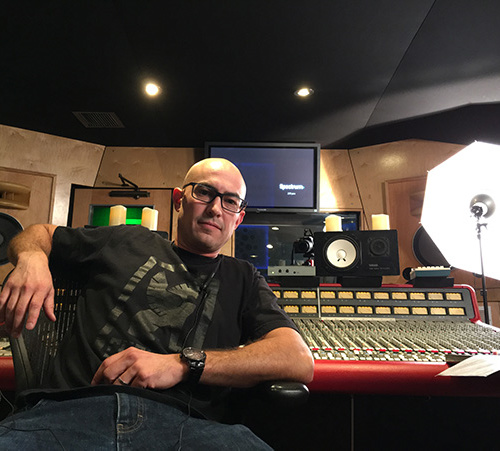
Ariel Chobaz
Ariel Chobaz is a GRAMMY-nominated, multi-platinum mix and sound engineer with many Billboard #1’s to his credit. After graduating from Musicians Institute with a degree in Recording Arts Technology, he became a strong force in the recording industry, quickly breaking records like mixing the most singles charted by a female rap album with Nicki Minaj’s Pink Friday and the record for most songs on Billboard Hot 100 with one artist. His mix on “Super Bass” propelled it to be one of the highest-selling singles in US history. While making radio hits, Ariel has gained the biggest honor in the business with an Album of the Year GRAMMY nomination as a recording and mixing engineer for Rihanna’s Loud and a win for Drake’s Take Care.
In the Fall of 2017, Ariel gained another #1 hit with his engineering on “Almost Like Praying” by Lin-Manuel Miranda, Jennifer Lopez, Gina Rodriguez and others. Throughout his career, his clients have included Nicki Minaj, Rihanna, Drake, Justin Bieber, Christina Aguilera, Britney Spears, Tyga, Lil Wayne, B.o.B. and many others that love his sound, work ethic, and passion for music.
He has also served as an instructor at Pro Mix Academy. His career has been featured in ABC News, Produce Like a Pro (several times, including “Mixing Hip Hop Vocals”, “Mixing Hip Hop”, “Top 5 Plugins”), Pro Audio Files, Pensado’s Place, Billboard, Heavy.com, Happy Mag, and Romper.
Check out his discography here. You can work with Ariel via his SoundBetter.

Bobby Owsinski
A long-time music industry veteran, Bobby Owsinski started his career as a guitar and keyboard player, songwriter and arranger, eventually becoming an in-demand producer and engineer working not only with a variety of recording artists but on commercials, television, and motion pictures as well.
Living in Los Angeles and always on the cusp of the latest technology, he was one of the first to delve into surround sound music mixing, co-founding the industry leader Surround Associates and eventually working on over a hundred surround projects and DVD productions for a variety of legendary superstar acts including The Who, Willie Nelson, Neil Young, Iron Maiden, The Ramones, and Chicago, among many others.
Bobby mixed a #2 album on the Billboard Blues charts for Adrianna Marie and her Bluescutters, and produced and mixed a #6 on the iTunes rock charts for the band SNEW.
Along the way, he has taught various disciplines of audio recording and multimedia production at Berklee College of Music, Trebas Recording Institute, and Nova Institute, and has been a guest lecturer at numerous colleges and universities around the world. He has also authored several courses for Berklee as well as the Multimedia Production curriculum for Nova Institute and over 20 online video courses for Lynda.com and his own BobbyOwsinskiCourses.com.
Combining his music and recording experience along with an easy to understand writing style, Bobby has become one of the best-selling Authors in the music recording industry with two dozen books that are now staples in audio recording, music, and music business programs in colleges around the world, including the best selling Mixing Engineer’s Handbook, The Music Producer’s Handbook, Social Media Promotion For Musicians and The Music Business Advice Book, which was a #1 best-seller on Amazon.
He has also penned hundreds of audio-related articles for a variety of popular industry trade publications including Pro Sound Web, Surround Professional, EQ, Billboard, Film & Video, The Hollywood Reporter, Pro Sound News, Mix, Grammy Magazine, Electronic Musician, Music Connection, Recording Engineer/ Producer and Music Executive Insider, among others. He also is a senior contributor to Forbes, writing about the “Big Picture” issues and trends of the music business.
Bobby keeps a busy schedule providing keynote addresses, masterclasses and workshops at various colleges around the world. A frequent Moderator, Panelist, and Program Director for a variety of industry conferences including NAMM, he has served as the Producer of the Surround Music Awards, and is one of the Creators and Executive Producers for the Guitar Universe and Desert Island Music television programs. He has also appeared on CNN and ABC’s 20/20 as a music branding and audio expert.
Get more sound advice from Bobby via Envato Tuts+, the Working Class Audio podcast, the Inspirational Creatives podcast, Pro Tools Expert, and the DIY Musician blog.
Bobby’s expertise has also been showcased via Sonic Scoop, Hypebot, Tape Op, Produce Like a Pro, Wisconsin Public Radio, and Showbiz Cheat Sheet.
Bobby’s Music Production blog at bobbyowsinskiblog.com is one of the most popular in the industry with over 14 million views, while his Music 3.0 music industry blog at music3point0.com is well over the 5 million mark. Bobby’s Inner Circle Podcast reaches more than 120,000 listeners per month and frequently sits in Apple’s Top 200 podcasts. His many online courses and programs can be found at bobbyowsinskicourses.com.
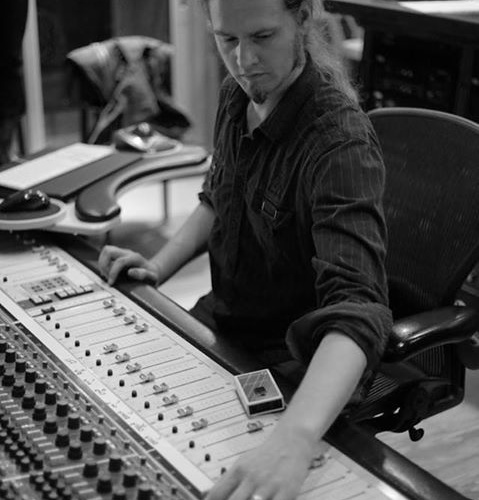
Julian Dreyer
I grew up in the mountains of Western North Carolina in the small artist community of Celo. Surrounded by musicians and artists both in my family and in the community, I have always been interested and involved in music. I played music throughout high school and subsequently attended UNC Asheville to get a degree in recording engineering.
After graduating Magna Cum Laude with a Bachelors of Science in Music Technology, I moved on to an internship at The Orange Peel where I quickly got a job there as one of the sound engineers. The four years of grinding out live sound production for hundreds of national touring acts gave me the experience I needed to transition into a House Engineer/Producer role at the newly opened Echo Mountain Recording Studio.
Here at Echo Mountain I have worked with many bands in a variety of roles over the past 13+ years and worked my way up to the role of chief engineer earning two GRAMMY nominations and one win along the way. I love music production and recording music and being involved in the creation of art. It is a part of how I grew up and will always be a part of who I am.
I have experience recording all styles of music from rock and blues, Americana and indie-folk, jazz and world, to bluegrass and Celtic music. I enjoy working in all styles and it is inspiring to find the common ground between them and the wider perspective that is informed by the variety.
GRAMMY-winning Engineer Julian Dreyer has received mentions for his work in Mix Online, Tape Op, National Geographic, The Mountaineer, No Treble, High Country Press, Smoky Mountain News, Music Rag, Citizen Times, and Winston-Salem Journal.
He has worked on recordings by The Avett Brothers, Steve Martin, Secret Agent 23 Skidoo, Widespread Panic, The Parlor Mob, Band of Horses, and many more. He is an API Audio artist and New Music USA member.
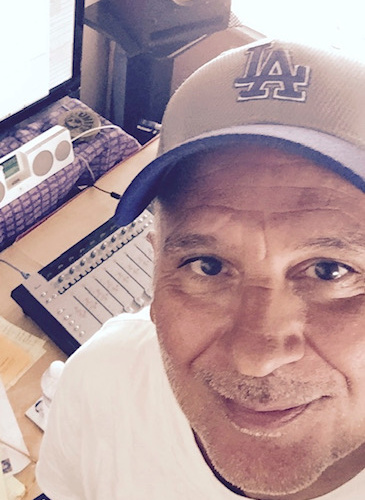
Brian Scheuble
Brian Scheuble is an independent mix and recording engineer. He has done work at Burbank, CA’s famed El Dorado Studios, Hollywood’s EastWest Studios, and San Diego’s Rarefied Recording, among others.
His career has received nods in American Songwriter, Mix Online, Women of Country Music, Total Rock, Guitar World, Light Sound Journal, SD Voyager, and Reverb.com.
Credits:
Zac Brown Band – Need To Breathe – Finger Eleven – Dave Matthews – Madi Diaz – Sheryl Crow – Trevor Hall -Five For Fighting – Brett Dennen – Serena Ryder – Tom Petty – Leann Rimes – John Mayer – Ice Cube – Aimee Mann – Phoebe Bridgers – Fiona Apple “TIDAL” – X – Ben Lee – Wallflowers – Sons Of Anarchy Show & Album – Elton John – Katey Segal – Danny Barnes – A Fine Frenzy – Matt Nathanson – Rachael Yamagata – Train – Whitesnake – Stevie Nicks – Five For Fighting “America Town” – Bethany Dillon – Edie Brickell – Backstreet Boys – Eric Hutchinson – Jon Bon Jovi – Robben Ford – Death Cab For Cutie – Stone Temple Pilots – Liz Phair – Michelle Branch – Ry Cuming – Mel Torme – Nine Inch Nails – Ryan Star – Crosby Loggins – Yes Man with Jim Carrey – I Nine – Motley Crue – Ringo Starr – Don Henley – Tom Petty & the Heartbreakers – Robin Zander – Colbie Caillat – U2 – Eric B. & Rakim – Dishwalla – MC Solaar Live – Barbara Streisand – Tina Turner – Adam Cohen – Crash Test Dummies – Marilyn Manson – Charlie Haden & Hampton Hawes – Dandy Warhols – Butthole Surfers – Marit Larsen – Robbie Robertson – Charlie Hayden Hampton Hawes
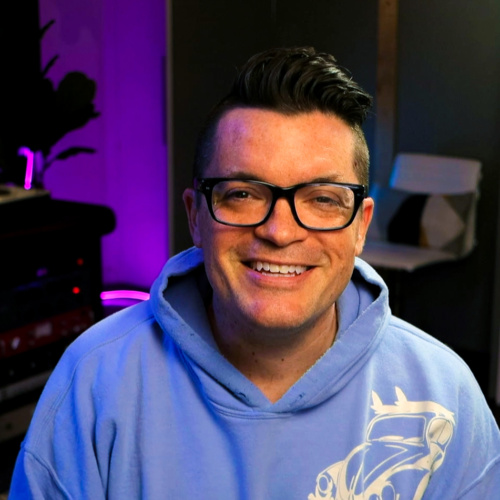
Dana Nielsen
Dana Nielsen is a Grammy-nominated mixer, engineer, producer, and multi-instrumentalist with an impressive portfolio that includes work with artists like SZA, Rihanna, Adele, Post Malone, The Smashing Pumpkins, Neil Young, Justin Timberlake, Weezer, The Avett Brothers, Bob Dylan, and Kanye West. Known for his versatility, Nielsen has collaborated extensively with legendary producer Rick Rubin, contributing to projects that span a wide range of genres, from Neil Diamond to Slayer.
Rick Rubin has often relied on Nielsen’s expertise for key projects, like Justin Timberlake’s FutureSex/LoveSounds, Red Hot Chili Peppers’ Stadium Arcadium, and The Smashing Pumpkins’ Shiny and Oh So Bright Vol. 1 (Napalm), which Nielsen recorded and mixed. In 2008, Nielsen mixed Neil Diamond’s #1 album Home Before Dark, and in 2013, he served as an engineer on Black Sabbath’s 13, the band’s first album to top the UK charts in 43 years. More recently, Nielsen has recorded and mixed albums for Santana and The Avett Brothers.
Nielsen has also made appearances on screen, showcasing his engineering talents alongside Rick Rubin and David Letterman in episode 4 (featuring Jay Z) of Letterman’s Netflix series My Next Guest Needs No Introduction. He is also featured in the SHOWTIME series Shangri-LA and the Judd Apatow/Michael Bonfiglio HBO documentary, May It Last: A Portrait of the Avett Brothers.
References
- 1. "27-4014 Sound Engineering Technicians". U.S. Bureau of Labor Statistics. published: May 2023. retrieved on: August 12, 2024
